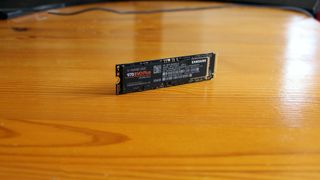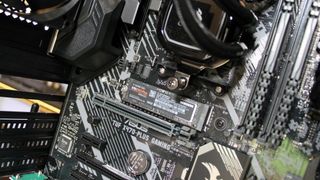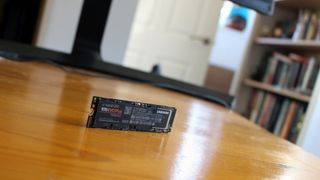IT Pro Verdict
Samsung’s best SSD yet outpaces the competition and maintains its excellence elsewhere
Pros
- +
A big improvement to file writing speeds; Reliable read speeds; Solid endurance ratings; Good business features
Cons
- -
A little pricier than rivals; Not everyone needs this speed; Occasionally struggles with complex reads
There's quite a battle going on in the world of SSDs. Samsung has long been the market leader thanks to several key product innovations and an insurmountable marketing budget, but many of its rivals are catching up thanks to copycat technologies and lower prices.
Samsung 970 EVO Plus 500GB: Design
So, while rivals like the Western Digital Black are using familiar flash technology at lower prices, Samsung has gone back to its lab and found something new: 96-layer V-NAND.
It's a huge change, because most of the market - including Western Digital, and including Samsung's older drives - is still building V-NAND using 64 layers. Jumping up to 96 layers should allow Samsung to include more transistors in each memory chip. Beyond that, it should also allow them to include larger transistors that are both faster and more efficient. In essence, they can work better because they've got more room to breathe.
The 970 EVO Plus also uses TLC technology, which means that each individual data cell stores three bits of data. Older SSDs use SLC or MLC technology to store one or two bits of data per cell, but the industry has largely settled on TLC - it offers good performance and better costs, because fewer memory cells are needed to store the same amount of data.
The end result of Samsung's new V-NAND is big performance improvements - according to Samsung, at least. The firm says that its 96-layer memory is 40% faster than 64-layer hardware, and that data write speed has been improved by 30%. And, amid all of this, Samsung says that its new drives are more efficient - they're only powered by a 1.2v charge rather than 1.8v charge.

Samsung's throughput figures bolster these claims. The firm claims a sequential read speed of 3,500MB/sec, which is a little better than the standard 970 EVO and also matches other drives at the top end of the market.
The big improvement comes with write speeds. On the 970 EVO Plus Samsung claims a sequential write speed of 3,300MB/sec. That's tremendous: 800MB/sec better than the standard 970 EVO and 300MB/sec better than the Western Digital Black.
We're used to today's SSDs offering great read speeds. That's great for the workplace, because workstation systems spend a lot of time loading and reading files. The move to 96-layer V-NAND is vital, though, because a big boost here could make operations faster across virtually all productivity applications. Up until now, they've lagged behind.
In other attributes, the 970 EVO Plus doesn't actually evolve when compared to the standard 970 EVO.
It's got the same Samsung Phoenix controller, and uses the same NVMe connection. It looks the same on the outside, with a tiny PCB, a smart Samsung label and a thin layer of copper to help with heat dissipation. You also still get TCG Opal, Microsoft eDrive and 256-bit AES encryption.
Samsung 970 EVO Plus 500GB: Price, Endurance and Warranty
The 970 EVO Plus is being sold in four capacities: 250GB, 500GB, 1TB and 2TB. Their prices, in turn, are 70, 98, 195 and 385.

The standard 970 EVO is also available in those four capacities, with prices of 60, 99, 183 and 361. The 500GB model is the only drive that has the same sort of price across the standard 970 EVO and Plus products - but none of the other 970 EVO Plus drives are much more expensive.
The 970 EVO Plus prices also compare well to the 970 PRO - Samsung's high-end consumer SSD. That drive is available in 512GB and 1TB capacities, and it costs 130 and 270.
So, in short, the 970 EVO Plus is not much more expensive than the standard 970 EVO. It's far better value than the 970 PRO models, too.
The 970 EVO Plus also compares well to its main rival: the Western Digital Black. That's available in 250GB, 500GB and 1TB capacities, and they cost 59, 98 and 212 respectively.
Samsung's new drive doesn't make any changes when it comes to endurance. The four 970 EVO Plus drives have endurance ratings of 150TB, 300TB, 600TB and 1.2TB of file writes - the exact same figures as the standard 970 EVO. They're also roughly the same as the Western Digital.
Those endurance levels are fine for the vast majority of workstation scenarios. You're only going to head towards those limits if you're constantly writing dozens of gigabytes of data to the SSD every single day - and no-one's going to do that, even in a workstation environment.

The warranty hasn't changed, either. You still get five years of coverage with the 970 EVO Plus - just like the 970 EVO and the Western Digital Black.
Samsung 970 EVO Plus 500GB: Performance
We've tested the 500GB version of the 970 EVO Plus. And, when it comes to sequential read and write speeds, it's fantastic.
Its read pace of 3,513MB/sec is superb, but it's the same speed offered by the standard 970 EVO and by the Western Digital Black. It's what we expect, and it's not far away from saturating the bandwidth of a PCI-E 3.0 4x slot.
It's sequential write speed where the big boost is found. The 970 EVO rattled through this test with a result of 3,283MB/sec. That's far better than the older 970 EVO, which topped out at around 2,500MB/sec - and around 500MB/sec better than the Western Digital.
CrystalDiskMark's other benchmarks give more of an insight into the 970 EVO Plus' numerous strengths and rare weakness.
Its random file read performance, generally, is excellent. In a test of small, random files, processed individually and queued in turn, the 970 EVO Plus returned read and write speeds of 696MB/sec and 608MB/sec. They're 200MB/sec and 300MB/sec ahead of the normal 970 EVO. The Western Digital Black was a little further behind both Samsung drives.

The next benchmark evaluates the drive's random performance when confronted with single files and no queues. Here the 970 EVO Plus hit 52MB/sec and 235MB/sec - with both scores outpacing both rivals.
In a test of eight small, random files being accessed simultaneously the 970 EVO Plus read and wrote at 1,042MB/sec and 2,512MB/sec. The latter score is miles ahead of rivals, but the former figure is actually about 600MB/sec short of the competition.
That last read result is the only CrystalDiskMark test where the 970 EVO Plus falls behind the competition. It's an indication that this drive may occasionally struggle when reading files in complex, simultaneous workloads.
Our other benchmark, ATTO, measures a drive's read and write abilities with small files of varying sizes. Unsurprisingly, the 970 EVO Plus performed extremely well.
It quickly accelerated, heading past read and write speeds of 1,000MB/sec when handling 16KB files. The Western Digital matched that when writing, but was slower and could only manage 1,000MB/sec when reading 64KB files. The 970 EVO only got to 1,000MB/sec when reading and writing 32KB files.
The 970 EVO Plus didn't just accelerate faster than its competition. Its peak read speed of 3,446MB/sec matched the Western Digital, while its top write pace of 3,136MB/sec beat the Western Digital drive by several hundred megabytes - and was almost 1,000MB/sec quicker than the standard 970 EVO.

It is, in short, a stonking set of benchmark results. When it comes to file reads, whether they're sequential or random, the 970 EVO Plus almost always equals or beats the competition with results that lead the market and almost saturate the drive's connection.
The move to 96-layer V-NAND has made a huge difference to file writes, too - there is clear air between the 970 EVO Plus and both its predecessor and the Western Digital Black.
Samsung 970 EVO Plus 500GB: Verdict
Samsung's move to 96-layer V-NAND is worthwhile. It maintains fantastic file read while delivering a huge boost to write pace - a move that will aid productivity in virtually every application.
The 970 EVO Plus beats its predecessor and the Western Digital Black in almost all benchmarks, with faster transfer acceleration and more capability when working with both sequential and random tasks. It only faltered when handling a complex read workload - and even then, its speed was still good.
Elsewhere, you get the same endurance as previous drives, a solid warranty, the usual business features and prices that don't differ much from the older 970 EVO and the rival Western Digital Black.
The Samsung 970 EVO Plus is a fantastic SSD that delivers a genuine step forward. Not everyone will benefit from a boost to write speeds, but it will definitely provide a boost to intensive office and workstation applications. If you're building a new office PC and need a fast SSD, this is the one to buy.
Verdict
Samsung’s best SSD yet outpaces the competition and maintains its excellence elsewhere
Mike Jennings has worked as a technology journalist for more than a decade and has been fascinated by computers since childhood, when he spent far too long building terrible websites. He loves desktop PCs, components, laptops and anything to do with the latest hardware.
Mike worked as a staff writer at PC Pro magazine in London for seven years, and during that time wrote for a variety of other tech titles, including Custom PC, Micro Mart and Computer Shopper. Since 2013, he’s been a freelance tech writer, and writes regularly for titles like Wired, TechRadar, Stuff, TechSpot, IT Pro, TrustedReviews and TechAdvisor. He still loves tech and covers everything from the latest business hardware and software to high-end gaming gear, and you’ll find him on plenty of sites writing reviews, features and guides on a vast range of topics.
You can email Mike at mike@mike-jennings.net, or find him on Twitter at @mikejjennings



